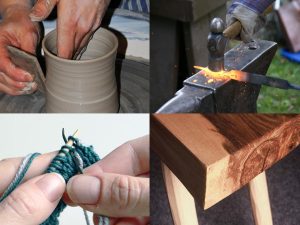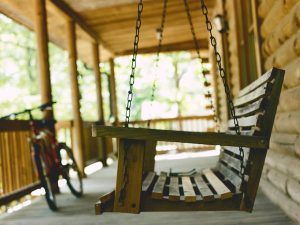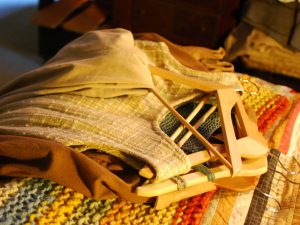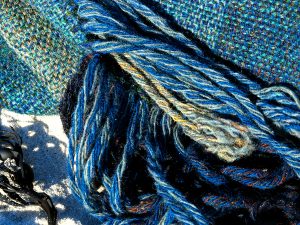If a fair share of the planet is a couple of ‘useful’ global hectares per individual, the planet could sustain about 10 billion people living primitively. In the countryside, voluntary simplicity, that is, carbon-neutral or -positive living that doesn’t rely on the exploitation of cheap foreign labour and concomitant ills, surely must consist of subsistence farming, or an even less modern way of life.
But such ways of life are simply not possible alongside a predominantly capitalist economy, whose logic subsumes and consumes all others. Why? I explained this in detail previously for Lowimpact.org, in reference to the Bank of England’s 2014 public confession of the money creation mechanism, and I illustrated it with reference to unacceptable compromises made for the survival of my own micro-business, typical of all business in global industrial capitalism. In a nutshell: because as long as we rely *at all* on money as we know it, our debt-based monetary system inherently creates artificial scarcity of currency that compels a cost-cutting race to the bottom which, in turn, necessitates infinite growth: infinite hunger for resources, and endless consumption. And the concomitant hunger for that even more expensive resource, local labour, must be satiated by machines, which… see the vicious circle?
But I want to dissect one particular assumption that this argument hinges upon: the assumption that machines are necessarily more productive, and therefore cheaper, than that most costly of resources: local human labour. In other words, for the labour of, say, ten locals who must be fed, housed, educated, entertained and enlightened, is there a machine that can achieve the same output for less input? Instinct tells me that, counting the cost of the impact of the embodied labour, resource and ongoing operation of the machine in all steps of its supply chain around the world through its lifecycle, there cannot be.
In Brittany where I hope to settle, there’s a campaign to reprendre la Bretagne des machines. My own campaign is to reprendre la campagne des machines, wherever that may be.
Industrial textiles production, like industrial agriculture, is one of the worst polluters in the world. I’m a ‘paysane-artisane’, only English doesn’t have a word for it and so it’s taken me 44 years to start to understand mine and my parents’ identities as maker-peasants. Basically, I was born and brought up in the countryside and, like my parents, have fought, sometimes floundered, to keep myself here by an ethical livelihood. In 2014, on seeing a way out of an increasingly neoliberal so-called university, and looking for the means of land-based livelihood I’d always needed and intended, I hit upon handweaving.

Fundamentally this choice was because the craft world was familiar to me and this craft could complement smallholding in that I could eventually produce my own raw materials (It’s ironic that I had to leave my rented smallholding and live on the road in order to afford to run such a business). I also love wool and needed to be quiet, creative, productive and autonomous. But the clincher was the loop-closing, recycling opportunity: Britain is littered with unwanted wool since over-production of the by-product continues from her woollen Empire days.
As anyone who’s followed me will know, I’ve been trying to for some years to settle, to land, to inhabit and help build a fibreshed and everything-else-shed. Around-these-isles exploration has shown that my best bet is Brittany.
This changes the picture a little: Brittany has relatively few sheep, almost all farmed at micro scale (mostly by smallholding incomers like I’m trying to be, eeek), and, despite being one of the most agriculturally productive parts of Europe (you guessed it, industrially), only one tiny spinning mill.
While there is seemingly some spare fleece around here too, I need a reliable supply for efficient product development and continuity, and so far there doesn’t seem to be any yarn here that equals the design or qualities of the Scottish island tweed producers I’ve been so inspired by and come to rely on. For a time I will be able to continue to use this fantastic and competitively-priced stuff, but not only will I have to pay EU import duty on it, I also feel I’d be cheating my new local economy. Producing my own may yet happen, and the Petite Filature Bretonne could spin it for €65/kg, which is twice as high a cost as importing the Scottish Island tweed but not much more than importing undyed English Jacob, my other mainstay.

I’m still weighing all this up, including looking at ways of selling locally for maximum congruence: I’m researching local wool fairs, craft markets, farm shops and makers’ association boutiques for tourists. The area is poor, and local craft retail prices are low; are both local production of raw materials and local costs of living low enough to match?
Of course there is recession and so far this is looking like my worst trading year yet. As so often I lie awake at night wondering whether to close the business and what on earth else I could physically do given my electrohypersensitivity. But every so often one of you comment that I’m an inspiration, and you keep me going. Last time I demonstrated with my loom on a sheep farm open day and invited everyone interested to have a go, the little crowd around me all day was movingly rapt.
I occasionally teach weaving and might develop that, but most of all I’m looking at how to move forward as a micro-farmer alongside other paysans-artisans. The cost of housing in Brittany, though only a fraction of the cost of that so unattainable in my native Devon, rocketed here during the pandemic too, and the Sleeping Beauty semi-derelict rubblestone cottage in her half-acre forest of brambles that was due to be my new home is fraught with holdups that may be terminal. But assuming my seven year search will eventually yield a roof and a modest patch of land, I will grow my own food. Will I keep enough sheep to produce my own wool? Will I share land with a friend who keeps sheep for meat or dairy and chip in for the wool? There are even more bureaucratic hoops for livestock farmers to jump through in France than in pre-Brexit Britain. And I don’t want to be part of ‘sheepwrecking’ verdant Brittany the way upland Britain has arguably been sheepwrecked.
When looking for a new place to root, inevitable was a granitic Celtic margin where people are tough but kind, and important was the criterion of lack of water stress. Most of the Atlantic coast of NW Europe usually has more rainfall than is consumed by its peoples, so the northwesternmost tip of France seemed a good bet – but in last year’s long drought it was even worse affected than some other areas.
My native Devon, on the Cornish border of England, is famous for its centuries-old hedgerows, which are particularly biodiverse banks atop stone walls held together by tree roots to encircle small fields and help retain water. But even in Devon, I began cursing what I saw as an ecological, social, cultural and economic desert of a landscape compacted and scaled up by machines, for machines; villages increasingly dead for holiday cottages, commuters, and privileged, rootless incomers living a materially comfortable but typically also stressed, carbon-high, urban life in the countryside – myself included. My mother’s native Cornwall fared even worse the sooner.

In the place I intend to land, the Monts d’Arrée, a very poor upland area of rural Finistère, the picture is similar, though gentrification less advanced: despite low land prices, disaffected would-be farmers clock up high rates of alcoholism and curse those un-oustable long-term farm tenants who farm subsidy as much as food: the Common Agricultural Policy (CAP, or, in French, PAC) payments that constitute 40% of the EU’s budget. (This is one significant reason why rural UK communities were typically pro-Brexit – because who wants a subsidy or a debt instead of a meaningful role and a viable business?)
Here, apart from in the peated or wooded granite uplands less good for arable, fields large by Devon standards count as well-cared-for if they rotate between monocrops of sprayed maize and wheat, so that actual desertification is marginally slower than if they held only one crop for years. Meantime livestock are farmed almost entirely indoors and unused hay bales are left to rot in miles of plastic wrapping in collapsing hangars.
But before the age of petroleum this area was mosaïcked with much more bio-diverse, human-scale farms. As in Devon, a small mixed farming system called bocage consisted of clusters of tiny fields as small as just one eighth of an acre, surrounded likewise by biodiverse banks (talus), lightly but intensively farmed by hand with a hoe (meaning, in this case, a lightweight mattock-shaped implement), like peasant lands the world over. This involved much more numerous crop types and rotations, much less deep soil disturbance and compaction, much better water management, much less pasture, and timber for building produced at home on your banks. In other words, the most successful, sustainable sort of agriculture: human-scale agro-sylvo-pastoral that provided the family with most of their material needs, including textile (often linen, here).
So what happened?
Many people curse those who choose to leave the land, and likewise those who choose to mechanise and scale up. However, my understanding is that in fact they historically had and presently still often have very little choice due to both push and pull factors: enclosures, clearances; loss of work due to the mechanisation compelled in turn by systemic financial squeeze; and a cruel feedback loop of subsequent desertification both metaphorical and literal. ‘That’s progress’ say some. Nope, that’s industrial capitalism dependent on a perpetual-growth monetary system, say I. A system that makes too many too rich, raising the wealth, comfort, convenience and concomitant technological requirements for all and so making subsistence lifestyles impossible even where desired. Here at home now as in the Global South, a death sentence for rural comunities. Which is looking a bit like a death sentence for our species and all the others we’re taking down with us.
‘Isn’t just surviving a sufficient act of resistance?’ suggested a micro-farming friend not long ago. She has a point, though like me she is also a principled environmentalist who strongly believes in social justice. Chewing over social Darwinism she reminds me that Darwin’s theory was actually inspired by that of his economist friend describing capitalism (and by ‘capitalism’ I mean the product of disenfranchised labour traded with an over-extractive monetary system); that it is not necessarily the most helpful framework for understanding evolution; and that ‘fittest’ is not necessarily the ‘strongest’ or the ‘richest’ but more often the ‘most adaptive’ – so potentially the more collaborative.
With cultural capital like mine, I feel a moral imperative, as well as the inspiration, to do better than just survive: to be among those finding a way to a truly sustainable way of thriving. I’m not there yet, but I’m delighted to spot dynamic others in this French-Breton rural fringe who are forming well-organised, chaotic exchange networks (emergent entre-aide and monnaie libre groups) out of sore need, great vision and simple good will: in other words, collaborative survival instinct.
This week I’m reading something that gives me hope, too. I’m reading that there’s another problem as major as industrial capitalism and its growth-hormone locking-system that is money as we know it. Why does this give me hope? Because I see another prong in the pitchfork with which I fight, and the reassuring power of the prongs of others’ pitchforks…
It concerns not our financing of agriculture but our very conception of agriculture: the understanding that the model that we take as the one and only, hailing from the Fertile Crescent, is a Steppe model with Steppe crops and Steppe animals appropriate to the Steppe landscape but less appropriate to our temperate forest of Europe. And in the history of agriculture there are precedents for civilisations pulling themselves back from the brink of destroying their habitat and adapting for a new, sustainable tack.
Should I really be working wool? Am I really going to replace it with linen, which is more laborious and more difficult to work? Wouldn’t hide clothing be the natural choice in temperate European forest? What animal would it be? Did our Paleolithic ancestors hunt them to extinction? Damnit, why do I fare so well on a Paleo diet when those ancestors of ours were almost as destructive as industrial capitalist man?
The books I’ve been reading are by French farmers Perrine and Hervé-Gruyère, the first in France to implement permaculture commercially (perhaps because of the apparent ideological oxymoron there?). Their first was ‘Miraculous Abundance: one quarter acre and enough food to feed the world’, and from aforementioned friend I’ve borrowed the first big tome of their follow-up manual, in French, and the essays in the opening chapters are fascinating.
But what I want to focus on here is their evidence that, contrary to my usual understanding, the growth-locking monetary system does not HAVE to thwart all who seek to trade ethically in it. The key may lie in our breaking out of a belief perhaps perpetuated by our growth-locking monetary system, notably that economies of scale as achieved by mechanisation are typically more productive and efficient.
Aiming for a petrol-free future and largely enacting it in the present, the Hervé-Gruyères cultivate, in a model that they call écoculture, a total growing area of just 1000 square metres of previously-marginal land in Normandy, entirely by hand, using organic (and better) methods in a permaculture design system involving perennials, maximisation of biodiversity, excellent water management and a small horse for carting. From this little plot they turn over not a minimum wage, but a living wage to feed their family. They have found, in collaborative research with AgroParisTech and the French government’s L’Institut National de la Recherche Agronomique (INRA), that they can be TEN TIMES MORE PRODUCTIVE per square metre than their organic counterparts farming with a tractor, and AS productive per hour. And all this on a smaller plot with much lower start-up costs and overheads and no borrowing for extremely expensive machinery.
Which *should* mean that many, many more existing farmers could in principle return to bio-sensitive methods appropriate to the bio-region regardless of the financial squeeze upon us all, right?
Now, I see four caveats:
- Half of all existing French farmers are due to retire in the next ten years, i.e. they are too old to get back on their hands and knees in their fields, and many have no interested family successors.
- The Hervé-Gruyères previously had been able to pursue well-paid professional careers, the savings from which covered initial outlay and paid them for the start-up period when the farm did not. That is, not everyone can do it, as rent/mortgage/loan repayments will usually preclude such small-scale, labour-intensive, low-pay paths.
- They have built a beautiful ecocentre on site with accommodation for a prestigious training scheme that enables them to exploit trainee labour. That is, the farm per se is not strictly, financially, self-supporting.
- From the sounds of their exclusive customer base (starred Parisian chefs among them), their retail prices may be higher than average shoppers can afford while everyone is under the squeeze of the growth-locking monetary system.
So in conclusion, for ecoculture, or really good farming, to feed ordinary people, we need planning reform that gives ordinary people proper access to small plots of land to farm and forest garden ourselves, and monetary reform that stops milking ordinary people so hard. Meantime, both sides of the channel, ordinary/desperate/imaginitive/bold/privileged/lucky people are creating microfarms, with and without permission, and extra-monetary markets for local craft-food and artisanry, so that hopefully decent systems will be in place for more people to join and make it more viable as industrial capitalism and its hungry money collapses around us area by area and piece by piece.
I’m trying to do that in Finistère, Brittany. When I settle into a fully equipped, static workshop I can streamline my raw materials, my products and my methods for an even leaner micro-business that may ultimately be more efficient, even financially, than a sweatshop in a developing economy. I may have to drop my prices radically. Selling only locally, I may have to undercut by living entirely without mod cons. I will find that sweet spot. You will buy three local scarves in your lifetime instead of thirteen from sweatshops, for the same price. And you will not let them fob you off: quality of life is a patch of ground of your own, not a pharmaceutical or a mobile phone. We who have the privilege of wildlife around us may have to forego the privilege of devices or retirement. Ironically, we may have to market-force our way home.
Help me walk my brave talk. If you’re interested in being a paysan-artisan alongside me, click here. If you’re interested in supporting me from a distance, it’s here. Oh, and meantime my still not-so-local and woefully digicomms-dependent shop is here. Because – don’t we all – I have to survive this year.
Merci, et kenavo !


















5 Comments
Affordability is a recurring theme in the commons / new economy world. It will be a fight that happens on many fronts, and the easy victories will come first. With the housing commons, for example, affordability is key to its success – and that will be the same with all sectors. When working people have access to more affordable housing, energy, water, broadband etc. they’ll have more money left over for other necessities that can’t be brought into the commons so easily.
Also, mutual credit trading networks will mean that working people can in effect purchase what they need with their work, rather than having to accumulate scarce money, which is being sucked out of their communities anyway.
This all depends on the success of commons building, but if it doesn’t work, I can’t see anything else to offer much hope. As our current economy continues its slide towards biosphere annihilation, war, and destruction of community resilience, global supply chains will break and force people to look for local solutions. I’m not optimistic, but I can’t see any other route. Peasant / artisan provisioning will be an important part of that, but there’s no chance that more than a very few people will gain those skills in time. It’s all pretty worrying, but you’re doing the right thing.
Hi Eloise, I too had a dream of rearing a few sheep, spinning the yarn and knitting or weaving clothes which when worn out simple return to the land to break down. And indeed it can be done and I have done it. The biggest drawback I came across was that rearing and looking after the livestock, haymaking for winter fodder, growing food for the humans and generally getting through the year is in itself a more than one person job, so adding in the shearing, cleaning, spinning and making was not realistically achievable. I think your idea of joining ranks with others and each doing their own speciality contribution might be better. Good luck
Nice to hear from you Pam, thank you, and thanks Dave too.
Yes, I think there’s wide consensus that self-sufficiency cannot be achieved alone, but that it takes a village… my friend says, a region, a nation, or even a continent…
I think above all it takes political will for both individual and collective radical (lifechanging) action, and for which you have to have a) sore need and/or a real fear of the future; b) insight — a very good critique of the status quo; c) skills; d) ideas, and above all, e) more confidence in yourself/family/friends/neighbours/colleagues than in the State and (capitalist) markets. Oh, and probably quite a risktaking nature!
And, yes, Dave, ‘affordability’ is such a dry, mundane word, but on a material level it entirely sums up our individual and collective existential crisis, doesn’t it? What I can afford, what my neighbours can afford, what the countryside can afford, what the city can afford, what the biosphere can afford.
I always come back to Satish Kumar’s ‘it’s not poverty that’s the problem, but wealth’, which I would develop by adding ‘and the poverty GAP created by wealth that leaves even the billions of us who are happy with *just*enough* economically compelled to attain more just to ‘keep up’ or to help our community members ‘keep up’ by continual consumption of each other’s product… a voracity locked in place, as we here understand it, by the present dominant monetary system with its inbuilt scarcity, as you say Dave…
SUCH an interesting, thought-provoking article & subsequent conversation deserves to be widely contributed to by the all too irritatingly silent majority. Wake up, folks & smell the proverbial (don’t drink the stuff myself) coffee reality in the not too distant future – perhaps not my generation but certainly children or grandchildrens’.
Unfortunately, as described, those with their eyes open will be prepared but woefully underresourced due to the crunch between existing & emergent structures. Not many are willing to forfeit ‘essentials’ – Netflix, surround sound tv, pay to view football etc – a straw poll of my neighbours found none inclined to resist their comfortable status quo.
Viva la revolution!
Hi Marcia, thank you very much for your kind comments. Yes, in my currently particularly angry state I’m even wondering whether we’re witnessing the emergence of a new species of Sapien in the city; I’m not sure how long the land-based Sapien can hold out, but I feel even less confident that the city Sapien will do so for long if increasingly divorced from land – or not in any way that I would choose for myself or my successors to live! Is there perhaps a case for conscious uncoupling? Would that help the survival of one or both? Vive la revolution indeed! Or the renaissance, at any rate. Keep in touch. Cheers, Eloïse